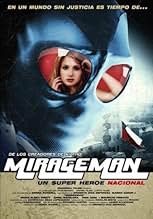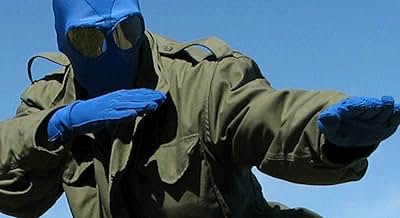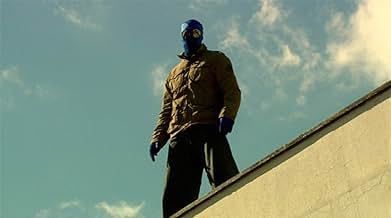CALIFICACIÓN DE IMDb
6.4/10
2.2 k
TU CALIFICACIÓN
Agrega una trama en tu idiomaA club bouncer with a dark past and great fighting skills decides to become a superhero.A club bouncer with a dark past and great fighting skills decides to become a superhero.A club bouncer with a dark past and great fighting skills decides to become a superhero.
- Dirección
- Guionista
- Elenco
- Premios
- 2 premios ganados y 4 nominaciones en total
- Dirección
- Guionista
- Todo el elenco y el equipo
- Producción, taquilla y más en IMDbPro
Opiniones destacadas
When you hear "superhero movie," its almost a given you think larger than life characters with over the top action scenes and heavy special effects. Sadly what I imagine will be lost on many potential viewers is that Mirageman is supposed to be what would happen if someone in the real world decided to become a superhero.
Sure, there have been famous superheroes before whose only "power" has been knowing karate, but Mirageman does a great job setting up the realistic consequences of someone putting on a mask to fight crime. His martial arts are impressive but they're very real, with no camera tricks or special effects to make them look cooler. He doesn't have a police scanner or anything, so he has to rely on people emailing him their problems to find out where to be (which some people abuse, naturally).
Mirageman is no god among men either; he gets surprised, beaten within an inch of his life and wonders what the hell made him think he could do this after a disastrous setback. But in the end, he realizes in a cynical world like ours one ordinary person can make a difference if they've got the courage to try.
Mirageman isn't your average blockbuster superhero movie, but if you're willing to accept it for it differences, you won't be disappointed.
Sure, there have been famous superheroes before whose only "power" has been knowing karate, but Mirageman does a great job setting up the realistic consequences of someone putting on a mask to fight crime. His martial arts are impressive but they're very real, with no camera tricks or special effects to make them look cooler. He doesn't have a police scanner or anything, so he has to rely on people emailing him their problems to find out where to be (which some people abuse, naturally).
Mirageman is no god among men either; he gets surprised, beaten within an inch of his life and wonders what the hell made him think he could do this after a disastrous setback. But in the end, he realizes in a cynical world like ours one ordinary person can make a difference if they've got the courage to try.
Mirageman isn't your average blockbuster superhero movie, but if you're willing to accept it for it differences, you won't be disappointed.
This movie would've been bad in the 70's where it belongs. It is exponentially bad for 2007. It was so obviously bad that I just went with it, like clearly this movie is going for ludicrous. The fight choreography was amateurish, the cinematography was high school level, and the plot was paltry.
"Mirageman" is "Kick-Ass" minus the novelty. "Meteor Man" minus the superpowers. "Blankman" minus the laughs. "Batman" minus everything. It was a 70's, low-budget, American-made, kung-fu movie in Spanish.
A masked man named Maco Guttierez (Marko Zaror), who barely speaks the entire movie, decides to fight crime in Chile in a cartoonish fashion. He even runs like a Japanese anime character. He fights crime in a place where people in groups attack him one at a time, and he has a thing for a pretty news reporter named Carol Valdivieso (Maria Elena Swett). If he was younger with a shell he could be a teenage mutant ninja turtle.
Maybe in Chile this movie was a hit, and even still they'd had to have been devoid of U. S. cinematic entertainment for years. This movie was neither creative, entertaining, or good.
"Mirageman" is "Kick-Ass" minus the novelty. "Meteor Man" minus the superpowers. "Blankman" minus the laughs. "Batman" minus everything. It was a 70's, low-budget, American-made, kung-fu movie in Spanish.
A masked man named Maco Guttierez (Marko Zaror), who barely speaks the entire movie, decides to fight crime in Chile in a cartoonish fashion. He even runs like a Japanese anime character. He fights crime in a place where people in groups attack him one at a time, and he has a thing for a pretty news reporter named Carol Valdivieso (Maria Elena Swett). If he was younger with a shell he could be a teenage mutant ninja turtle.
Maybe in Chile this movie was a hit, and even still they'd had to have been devoid of U. S. cinematic entertainment for years. This movie was neither creative, entertaining, or good.
Full review on my blog max4movies: Mirageman is a low-budget action movie that focuses on a more or less realistic story of a bouncer turned vigilante. The independent production lacks in cinematography and the plot and the comedic undertones may not always work as effectively as they should. However, this doesn't mean that Mirageman is simply a cheap copy of similarly themed movies like Kick-Ass with a considerably higher budget and well-known actors. The stunt work and choreography are impressive and the gritty performances make the movie feel realistic and compelling. The movie also never takes itself too seriously, which makes for some light-hearted and funny bits - that are also accompanied by some more serious discussions about the morality of vigilante actions in general. In total, Mirageman is a convincing and entertaining action movie package.
This is another very good pairing of Chile's Mark Zaror and Ernesto Díaz Espinoza in a martial arts action film. This film surrounds Zaror's attempt to become a vigilante after the murder of some family members. The film has real heart and some very good fight scenes. It is a great vehicle for Zaror to display his fighting skills. The training scenes are among the best you will see in any film. The film is low budget, and that shows in its cinematography and, especially, in its musical score. The acting is good. The script is original. Zaror is great, and in this one he does not take himself too seriously. It is no wonder he has become one of the most sought after so-stars for martial arts and action films, including John Wick 4.
Here comes a new superhero movie from
Chile? Why not? This is not a typical superhero story. In fact 'super' is downright inaccurate while 'hero' just barely applies – at first.
Marko Zaror, a stuntman and reputed martial artist, stars as Maco, a quiet and respectful bouncer working at a local strip club. When not working, Maco is a fitness and workout nut. The seemingly gratuitous scenes showing Maco working out, charting calories, and taking amino acids seem like filler at first, but what the film is doing is introducing the character and showing his solitary life that contains little meaning outside of fitness and his institutionalized brother.
Maco's family was brutally attacked three years earlier. In the attack, the father and mother were murdered, the youngest brother beaten and sodomized, and Maco was beaten to near death. Since that time Maco has been training, working out, fanatically practicing martial arts for something. Maco's brother is in a mental hospital due to the severe trauma of the murder and rape.
One night while jogging Maco stumbles across a robbery in progress outside of a suburban house. After instinctively disabling one bad guy, Maco hears screams coming from inside the house. Maco grabs the bad guy's mask and enters, surprising the bad guys and saving the day. One of the rescued victims is ambitions tabloid television reporter Carol V (María Elena Swett).
Carol V broadcasts a commentary piece the next night on her television show in which she calls the man that rescued her a "hero" without a Batmobile or cape. Maco is stunned by the reaction and the gears in his head start clicking. The gears become unstoppable when Maco visits his brother at the institution. For the first time since the attack, Maco's brother is responsive. It seems he was inspired by the report of the regular guy superhero. Maco then becomes convinced that he can stop the type of evil that happened to his parents, inspire his brother to get better, and perhaps earn the adoration of such public as Carol V.
"Mirageman" is a difficult and ultimately rewarding movie. In it's short 87 minute running time, "Mirageman" changes tone three different times. By far the most amusing scenes come early in Maco's career as Mirageman. Mirageman has to fight what would be the first real life challenge of any superhero: Practicality. Mirageman has to overcome cumbersome costume difficulties which include time required to change into the costume and where to stash his non-hero clothes. And of course transportation. Although Maco's "origin story" is similar to Bruce Wayne, Maco is no billionaire. His costume is pieced together from a sporting goods store and he owns no car. At first he takes the bus when battling villainy.
"Mirageman" also revels in the belly-bouncing glee of how a superhero must hold himself while walking around. "The Dark Knight" and "Spider-Man" never shows the viewer what it's like when the Caped Crusader or the Web-Slinger has to, say, simply walk up stairs or down a hallway. How would they act while doing the mundane? Marco deals with that as Mirageman. The extended sequences showing the costumed Mirageman 'creeping' in bright sunlight with his arms held to ready like an arcade game are both funny and uncomfortably awkward.
The second tone of "Mirageman" deals with the life of a hero after he's sorta figured it out. This includes the surprising public reaction to their very own superhero and the ways that a simple masked man trying to do good can be exploited and become something of which he never wished. Maco also has to deal with what fans he has and hopefully deal with that embarrassing transportation issue. Maybe a sidekick would be just the thing?
Maco goes through many transformations during the movie. I honestly can't remember more than one or two lines that Zaror has as Maco. Most of the character building is deftly conveyed using what the viewer already knows about 'superheros' and situational drama. Although he never says it, we feel Maco's pain, inadequacies, and sense of justice.
The third tone is set as Maco has to deal with these issues and the very real likelihood that, in order the make a real difference, he may have to risk it all.
The last act is brutal and realistic – a sharp contrast when compared to the relative camp of the opening act. One gets the feeling that this is what it would be like to take that mantel of responsibility.
Mirageman is left exploring a final question. Does he truly want to be a Hero?
from www.PopBunker.net @popbunker
Marko Zaror, a stuntman and reputed martial artist, stars as Maco, a quiet and respectful bouncer working at a local strip club. When not working, Maco is a fitness and workout nut. The seemingly gratuitous scenes showing Maco working out, charting calories, and taking amino acids seem like filler at first, but what the film is doing is introducing the character and showing his solitary life that contains little meaning outside of fitness and his institutionalized brother.
Maco's family was brutally attacked three years earlier. In the attack, the father and mother were murdered, the youngest brother beaten and sodomized, and Maco was beaten to near death. Since that time Maco has been training, working out, fanatically practicing martial arts for something. Maco's brother is in a mental hospital due to the severe trauma of the murder and rape.
One night while jogging Maco stumbles across a robbery in progress outside of a suburban house. After instinctively disabling one bad guy, Maco hears screams coming from inside the house. Maco grabs the bad guy's mask and enters, surprising the bad guys and saving the day. One of the rescued victims is ambitions tabloid television reporter Carol V (María Elena Swett).
Carol V broadcasts a commentary piece the next night on her television show in which she calls the man that rescued her a "hero" without a Batmobile or cape. Maco is stunned by the reaction and the gears in his head start clicking. The gears become unstoppable when Maco visits his brother at the institution. For the first time since the attack, Maco's brother is responsive. It seems he was inspired by the report of the regular guy superhero. Maco then becomes convinced that he can stop the type of evil that happened to his parents, inspire his brother to get better, and perhaps earn the adoration of such public as Carol V.
"Mirageman" is a difficult and ultimately rewarding movie. In it's short 87 minute running time, "Mirageman" changes tone three different times. By far the most amusing scenes come early in Maco's career as Mirageman. Mirageman has to fight what would be the first real life challenge of any superhero: Practicality. Mirageman has to overcome cumbersome costume difficulties which include time required to change into the costume and where to stash his non-hero clothes. And of course transportation. Although Maco's "origin story" is similar to Bruce Wayne, Maco is no billionaire. His costume is pieced together from a sporting goods store and he owns no car. At first he takes the bus when battling villainy.
"Mirageman" also revels in the belly-bouncing glee of how a superhero must hold himself while walking around. "The Dark Knight" and "Spider-Man" never shows the viewer what it's like when the Caped Crusader or the Web-Slinger has to, say, simply walk up stairs or down a hallway. How would they act while doing the mundane? Marco deals with that as Mirageman. The extended sequences showing the costumed Mirageman 'creeping' in bright sunlight with his arms held to ready like an arcade game are both funny and uncomfortably awkward.
The second tone of "Mirageman" deals with the life of a hero after he's sorta figured it out. This includes the surprising public reaction to their very own superhero and the ways that a simple masked man trying to do good can be exploited and become something of which he never wished. Maco also has to deal with what fans he has and hopefully deal with that embarrassing transportation issue. Maybe a sidekick would be just the thing?
Maco goes through many transformations during the movie. I honestly can't remember more than one or two lines that Zaror has as Maco. Most of the character building is deftly conveyed using what the viewer already knows about 'superheros' and situational drama. Although he never says it, we feel Maco's pain, inadequacies, and sense of justice.
The third tone is set as Maco has to deal with these issues and the very real likelihood that, in order the make a real difference, he may have to risk it all.
The last act is brutal and realistic – a sharp contrast when compared to the relative camp of the opening act. One gets the feeling that this is what it would be like to take that mantel of responsibility.
Mirageman is left exploring a final question. Does he truly want to be a Hero?
from www.PopBunker.net @popbunker
¿Sabías que…?
- TriviaThe first chilean superhero movie ever.
- ConexionesReferences Hombre-araña (1977)
Selecciones populares
Inicia sesión para calificar y agrega a la lista de videos para obtener recomendaciones personalizadas
Detalles
Taquilla
- Total a nivel mundial
- USD 390,003
- Tiempo de ejecución1 hora 30 minutos
- Color
- Mezcla de sonido
- Relación de aspecto
- 1.78 : 1
Contribuir a esta página
Sugiere una edición o agrega el contenido que falta

Principales brechas de datos
By what name was Mirageman (2006) officially released in India in English?
Responda















